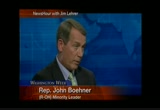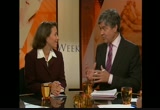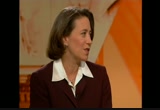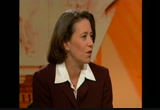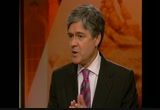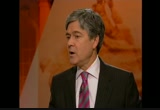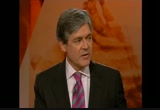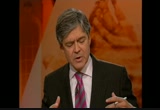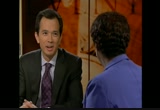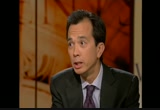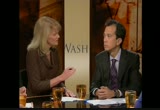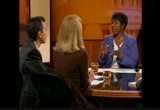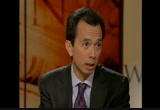tv Washington Week PBS September 19, 2009 4:30am-5:00am EDT
4:30 am
gwen: republicans and democrats grow even farther apart on health care, on defense, on just about everything. we explore why, tonight on "washington week." the health care fight brings out the big guns. >> this is our chance to reform health care in america. we cannot let this opportunity pass. >> i will not waste time with those who have made the calculation that it's better to kill health reform than to improve our health care system. >> what we're saying to the united states snot -- senate, to the gang of six, is thanks but no thanks. >> the status quo is unacceptable. it is holding women and families back gwen: and the fight morphs into a larger cultural debate president >> an overwhelming portion of the intensely demonstrated animosity toward president barack obama is based on the fact that he is a black man. >> i believe we are on the brink of a great american
4:31 am
awakening and it will begin here and begin now and begin with you. gwen: the u.s. reverses course on missile defense abroad and immediately goes on the defensive at home. >> those who say we are scrapping missile defense in europe are either misinformed or misrepresenting the reality of what we're doing. gwen: while one year after a giant final meltdown, some see signs of hope. >> prosspeths -- prospects for a return to growth in the near term appear good. gwen: we go to the reporters covering the week. ceci connolly of "the washington post", john harwood of cnbc and the "new york times," martha raddatz of abc news, andyy. andyy -- greg ip of the economist. >> celebrating 40 years of journalistic excellence, live from our nation's capital, this is "washington week" with gwen ifill, produced in association with "national journal."
4:32 am
corporate funding for "washington week" is provided by -- >> we know why we're here. to redefine air travel for a new generation. >> to ensure our forces are safer and stronger. >> to take the world we share to tomorrow and beyond. >> around the globe, et people of boeing are working together to make a difference. >> that's why we're here. >> major funding is also provided by the annenberg, the corporation for public broadcasting, and by contributions to your pbs station from viewers like you. thank you. once again, live from washington, moderator gwen ifill. gwen: good evening. after weeks of closed-door negotiations and carefully
4:33 am
floated trial balloons, we finally got to see the senate finance committee's health care plan this week. minus the public option the president says he wants, minus the republican support committee chairman max baucus says he wants, and minus the price tag that critics have said could explode the federal deficit. so everybody's happy, right? not so much. listen to what house minority leader john boehner had to say on the newshour last night. >> i don't believe that any of these health plans that we've seen thus far from the democrats in congress can pass in any way, shape, or form. and i do believe that the president at some point's going to have to hit the reset button the gwen: but lack of republican support is not the only problem. many democrats are missing in action too. ceci, what did the baucus plan include after all this buildup and what didn't it in? well, something called an individual mandate, a
4:34 am
requirement that every american carry insurance, with some tax credits for small businesses that might have trouble carrying it. all the items the president has been talking about for a long time are in there. we know it would cover about 30 million more americans, out of about 4 million uninsured so that's a big increase in coverage and there would be real changes in the ways doctors and hospitals behave. not in the bill is that public option we've heard about. that's not too surprising. maybe more surprising is that senator baucus did not put in any kind of requirement on employers in this country. that's a big difference and perhaps a little bit of a surprise. >> -- gwen: those two things are the big difference between what senator baucus is putting out and what the president said last week and has a lot to could -- do with the price tag
4:35 am
being a lot less? >> yes. absolutely right. and senator balk u.s.a. -- baucus was determined to come under that horrible t word, one trillion dollars. the main way he accomplishes that is by keeping thesubsidies, the tax credits and discounts lower than you see in the house bill. >> speaking of the subsidies, so you now have democrats, many liberals, and those are baucus' negotiating partners, not really the republicans anymore especially -- except for olympia snow, and even snowe when i interviewed her this week said i want more subsidied for low and middle income people. can they find money for that? what do you think is going to happen on that? >> the other thing that senator baucus put on his bill that's a new twist is this big tax on what they call cadillac insurance policies. but they're really not that
4:36 am
cadillac according to so many people. he's looking at an $8,000 policy for an individual. we know that many unions, the average policy in this country is up around $12,000. so it's a tax that could potentially hit a lot of people. to your question about is there room to increase thesubsidies, there's always room for a little bit of horse trading. we're really just getting into the fun right now. this is just the first year, what's called a chairman's mark when he puts down his ideas. all next week there's going to be all kinds of amendments going on out in public and bind closed doors. gwen: i think there is a sense that some form of this could get through but could it fall part? >> absolutely. think no further back than the clintons in 19923-1994 when democrats also controlled the white house as well as congress and things fell apart. my sense is that one of the
4:37 am
real dangers in a policy, in a bill that is this enormous, it affects one sixth of president he is he is -- u.s. economy is that it could die by a thousand little changes. one change, senator baucus proposed a fee on the medical devipes manufacturers, the people who make wheelchairs, scooters, and even breast pumps. there would be an increase in the price of those items. there is a very grease -- aggressive lobbying effort to get that knocked out of the bill. you say no big deal, a few billion dollars, not that critical to health care reform but if that happens over and over and over again he -- you really lose the heart of the legislation. >> but isn't it true as president obama keeps saying that in fact they're much further down the road than president bill clinton ever got in >> yes. they have moved much more rapidly and made much more
4:38 am
progress in terms of committee action. >> of course one of the things that killed clinton's plan was opposition from industry. now baucus is taking quite a bit out. what do we hear from the various stakeholders? gwen: and state governments who aren't happy about what they consider additional mannedities for medicare coverage. >> all long the idea has been to calibrate the pain so everyone suffers you alittle but there's not a fatal below -- fatal blow to any one. >> does that mean max baucus did a better job than people gave him credit for? >> yes, he does deserve credit for keeping so many people at gwen: you may have -- tpts just the beginning because you may have noticed, the debate over health care is only the tip of
4:39 am
the iceberg. if you put your ear to the ground in washington these days it's almost like you can hear the fault lines opening up on all kinds of touchy issues you're not supposed to talk about at the dinner party, including violence and race and nancy pelosi said the tone reminded her of the type that leads to political violence. john boehner said he smells a rebellion underway. seems kind of hair-trigger to me, john. >> it is. and fortunately we're after dinner so we can be a little more cannedity. some of this is exaggerated in the sense that, you know, nancy pelosi was talking about the 1960's and 1970's. there you had i think a much broader, more broady distributed level of course emotion -- gwen: talking about assassination, to be clear. >> yes, certainly than happened but i think she was talking about an era where feelings were so powerful. i think this is a case where there are a small number of people on either side who feel exceptionally passionate and they're louder. we can hear them more.
4:40 am
most ordinary people are not passionate about politics. it's sort of the weirdoes at either end of the spectrum -- >> i resemble that remark! >> well, look, a couple things behind this. one is growing pards difference -- partisan difference -- differences in the country reinforced by the fact we no longer with -- have a buffer. conservatives are all in the republican party, liberals are all in the democrats. they have much, much less in common and you have this fragmented media environment fed by cable tv and the internet where you have very strong -- strong voices that are rewarded for being strong and extreme. the result of that is in the bushstration streags you had people who when the bush team wanted terror surveillance and looking at people's phone or
4:41 am
internet record people saw the specter of some sort of a fascist state and -- gwen: but is jimmy carter considered to be extreme? >> i think he said something that was extreme. i'll get to him in a second. the other thing you have is on the right people projecting that barack obama is going to somehow create some sort of socialist government. race is an added element to that. jimmy cafert -- carter, who is a person of another generation who grew up when racial feelings were especially intense is now saying that the overwhelming majority of emotion comes from race. that seems a little bit strong to me. i think race is part of it. barack obama is a different president than we've had before. he's somebody not only because of his race but because of the unusual nature of his background, growing up overseas for part of the time. , even coming from hawaii, it's a different milieu he was around through much of his childhood and how you disentangle what's race and
4:42 am
what isn't is hard to do. but there's no doubt it's an element. >> but john, these forces are so loud and so dom unate the debate. how do you go past that fury? really, those are the voices we've heard over and over again. they're powerful. they may be a small number on the extreme left and extreme right but they're powerful. >> well, they are. but look, the nominating process in presidential politics ultimately reflects the will of the people when you look at it in its totality. the furtherest left candidate doesn't always win. the furthest right candidate doesn't always win on the republican side. president obama by the description of olympia snow, republican from maine, is pushing a somewhat moderate, in her view, health care plan. it's not always being described with those terms but he's making headway with it. if he succeeds with what he's doing -- his poll numbers are down right now -- you may see
4:43 am
some of that change and the fears of people that they're projecting onto barack obama of what might happen -- >> so do you think this is a problematic distraction from the white house or a relief from all the other serious stuff they're slogging through? >> i think it's problem at ig -- problematic. this president doesn't like it. you've seen him over and over criticize the 24/7 media culture, cable tv, he doesn't like cable tv. he doesn't like the extremes yet he's battling those voices so i think that's not the washington he wanted to be involved with. i think he, i do think i wanted to have a different kind of working relationship than many republicans in the capitol than he has had and that's kind of the nature of where the two parties are right now. >> john, what does this mean in practical terms for the republican party?
4:44 am
obviously to a certain extent they're riding it, feeding it. will this benefit in the mid terms next year, for example? >> i think the republicans are headed for a decent mid term election anyway. history makes that happen because there's a reaction against the president and party especially when he's trying big things. i don't think the extreme voices particularly benefit the republican party. i think they're more likely to rise and fall on the success or failure of obama rather than what they do in the midterm elections and i think republicans are especially disoriented at this moment buzz -- because not only did they have a failure of the bush administration of some of their most cherished principles, the free market, free -- the role of the government in katrina, that support of thing, then bush supported a massive intervention and that caused some people to blow a gasket because that's what democrats do. then when barack obama comes in
4:45 am
and continues and expands those policies they've got to ratchet up the level of criticism to it because it was started under a republican president. gwen: ok. we have a lot of other stuff to get to tonight. the president surprised allies and enemies alike this week when he announced plans to drop plans for a european-based missile defense shield. and his military advisors unsettled some in his own party when they said they want to step up, not scale down, troop presence in afghanistan. first to the missile defense story -- why this and why now, martha? exactly what was that all about? >> it surprised everyone but it's clearly something they've been working on for a long time and think had -- they had another assessment of the threat from iran. they said they're going to change the chm -- system. the key is they're not going to plant those land-based radar interceptors in the czech republic and poland which had completely out raged russia. the timing of this, why, is that we have the u.n. general
4:46 am
assembly next week and we have the g-20 next week and a lot of foreign -- gwen: it also happened on the 70th anniversary of the soveyelt invasion of poland. not great timing. >> that was not what they meant to do and that was sort of lost in all this and certainly lost on them. but they will not say russia has anything to do with this, although i thought secretary of defense robert gates was very honest about this. he said well, it was almost exclusively about the threat were -- from iran but he did say this will allay some of russia's unfounded fears about having the land-based interceptors. >> did we get something in return from russia? >> well, russia is so happy about it. what a surprise. i think that is the question. we all have to watch is there payback for what the united states did? do we see russia ponying up on
4:47 am
the sanctions, which is really what they want? they've already made noise that's no way, this isn't the time for more sanctions. if -- but if they don't get anything from this but making russia happy they're going to come under further criticism. >> could i ask a practical question? as i understand it the administration is arguing, want to focus on the threat of missiles from iran. i thought the democratic position was missiles didn't work in the first place. so is there some reason to think the systems would work better defending one kind of missale -- missile than another in >> well, the threat changed, so says this assessment, from long range missiles to shorter and medium range missiles so they're saying if they put them on ships, they can move around to protect europe and it will work better just because the
4:48 am
threat has changed. it is a layered feature they have. they have the ship base, eventually some sort of land base but i wouldn't count on it. >> i wanted to ask you about afghanistan. we heard different messages from different people in the administration. one is we need the pre -- resources to execute -- execute the strategy and the other is we need the strategy to get the resources. which is which? >> i think you're talking about secretary gates and admiral mullen, the chairman of the joint chiefs of staff, seeming to have different messages all the time. the strongest is that secretary gates seems -- keeps saying we have plenty of time on these troop requests that the commander in afghanistan is going to say while admiral mullen is saying we have 12 to 18 months to make a difference. so you're getting lots of mixed messages out of the pentagon in particular about how the troop buildup will work. >> and do you think they know how many troops they'd like to
4:49 am
go and request? and when we hear president obama saying i thick -- take this notion of sending soldiers into serious spots very seriously and i'm upon dering it, what's pinned -- behind that? >> stan mcchrystal knows how many he wants but no one is asking the nucks the >> she's asking himent i'm asking him but not getting anywhere on that! no one wants this to happen right now in the middle of the health care debate. let's face it. but it's a very good point. president obama is saying i have to take time on this because i'm sending people off to war and people can get killed. guess what? people are getting killed there every single day and when he sent 20,000 troops right away when he took office it didn't take him quite so long. they hired a new commander, fired another one. he wanted him to have a strategy -- gwen: against the back drop of
4:50 am
fading support among democrats? >> absolutely. you have fading support on the hill and among the public. 51% of the -- those polled said they didn't think 9 war was worth fighting and that's afghanistan. >> ok. gwen: now let's talk about the economy as if there's not enough going on. one year later, the nation and the world are still recovering from the biggest economic meltdown in decades, but what have we learned in that time and is the worst behind us. the fed chairman seems to think so. it wasn't really green shoots but he was saying he could see the end. >> in a technical sense and he's probably right. he doesn't get to make that declaration. that is -- that's up to the joint committee of economists. but what does he mean? things like retail sales, industrial production, even housing starts have started going up a little bit. but the thing people care most
4:51 am
about is employment and that's still going down and given that it is almost a sure thing that this economic recovery is going to be very weak by historical standards it's going to be some time before unemployment starts going up and an even much longer time for it to come down. for the average person out there it's going to seem like a recession for a very long time. the crisis is still ahead of them. it's not over by any means. >> i have to say i'm one of the lay people in all of this but has anything changed in -- on wall street? gwen: yeah, the president went up there monday and gave another strong speech. >> yeah, he said stop behaving like it's 2007 and you don't need to wait for new laws to behave differently. there's been a lot of attention paid to wall street, the billions set aside for bonuses. but there are fewer of those people. there have been a quarter million loofs on wall street.
4:52 am
some of the biggest firms are simply not there anymore. but the culture is still the same. it's still on wall street, eat what you kill. when you have a really good quarter you take most of that home with you and that's not going to change until we have regulations that tamp down the risk-taking. >> people talk about a jobless recovery. what makes a jobless recovery? is there anything the administration can do to make it less jobless? >> essentially the economy has to grow at least 2% a year to keep the employment rate steady. what people mean is that the economy is only going to grow barely around 2%, at that level. ine -- i've seen forecasts the unemployment rate won't be down around 5%, which is where it was at the beginning, for another decade. what can the administration do? the pressure is on them not to take their foot off the
4:53 am
accelerator too soon. when the president goes to pittsburgh next week i expect that willing one of the commitments he and the other leaders of the g-20 make, which is not to hastily withdraw the fiscal stimulus and not have the central banks quickly raise rates because of the fear of inflation. >> could i ask you quickly about the psychology of this? we've talked over the past year about the psychological of the markets and of a recession. will this change people's spending habits and is it not a good thing? >> the psychological -- schol already has changed actually. the stock market is up 50%. >> but regular consumers? >> regular consumers are facing two new realities. used to be if you had a post, you could get a loan. that'sover. and obama in his speesm monday said -- made it clear his
4:54 am
priority is to create a structure where those kind of loans are never made again. also the public has lost $2 trillion of their wealth in the past year. there is going to be a lot of savings that needs to be sun -- done and when the country as a whole is saving more, the economy can't groat gwen: after a year of government intervention in the auto industry and stimulus spending for potholes and other things obviously and a year of intervention on all these fronts which has resulted in this suspicion among so many people about government intense,, is that hurting the president's ability to champion government intervention for health care reform? >> oh, i absolutely think it is having that effect. look, for the last 200 years the pattern has been we have wars, crises, and the government increases involvement and when the war is over the government pulls back
4:55 am
but never as much as before the war. we still think of ourselves as a small government society, the government that governs best governs least, that sort of thing. but the government is now the biggest shareholder in banks, in general motors, so forth and look at the national debt soaring out of control. how will we ever pay this back? there is a natural, understandable recoiling among people from all this intervention so when the president comes along with what represents another large intrusion, there are very good reasons for people saying where does this snop >> gwen: thanks, everybody. we're done here but the conversation continues on line. choutchout -- check out our "washington week" webcast q and a. keep up with daily developments on "the newshour" and we'll see you again next week on "washington week." and to those of you celebrating
4:56 am
rosh hoshana, we wish you the best in the new year. good night. >> "washington week" was produced by weta, which is solely responsible for its content. corporate funding for "washington week" is provided by -- boeing. major funding is also provided by the annenberg foundation, the corporation for public broadcasting and by contributiones to your pbs station from viewers like you. thank you. >>
2,636 Views
IN COLLECTIONS
WMPT (PBS) Television Archive
Television Archive  Television Archive News Search Service
Television Archive News Search Service 
Uploaded by TV Archive on

 Live Music Archive
Live Music Archive Librivox Free Audio
Librivox Free Audio Metropolitan Museum
Metropolitan Museum Cleveland Museum of Art
Cleveland Museum of Art Internet Arcade
Internet Arcade Console Living Room
Console Living Room Books to Borrow
Books to Borrow Open Library
Open Library TV News
TV News Understanding 9/11
Understanding 9/11


